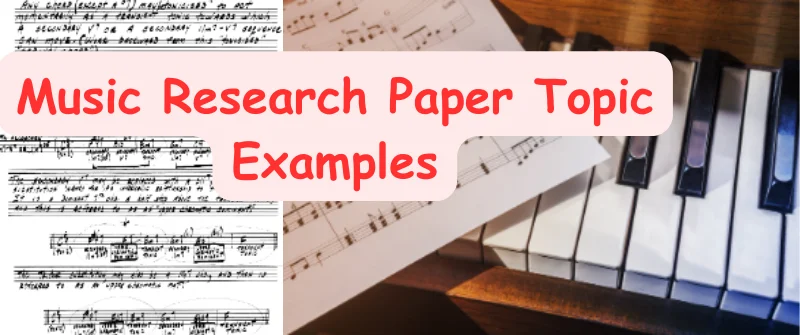25 Most Popular Music Research Paper Topics for Writing

Research papers aren't just for history class or the social sciences. Research papers can be assigned in any course, and that includes music class. The world's musical traditions are fertile ground for research, but because we have been conditioned from childhood to think of music as entertainment rather than a subject for academic research, it is often difficult to come up with interesting and effective topics for a music research paper. Fortunately, music research papers are often more fun to write than other types of research paper because they have such a wide range of interesting topics to explore.

Choose from these stellar popular music research paper topics
Are you stuck looking for a music research topic? Well, you're in luck. We have twenty-five music research paper topics that will spark your creativity and get you started with your next paper. You can pick up one from this list, you can combine several of them, or maybe you will get inspired by this list and come with several topics on your own. In any case, make sure that the popular music topic for your research paper is interesting to you personally, and doesn't just sound potentially easy to write about.
1. How is music marketed by demographic? Explore the different ways music companies target various demographic groups such as age and gender. 2. How does the categorization of music affect consumer purchasing decisions? Examine how the emphasis on genre either enhances sales or limits consumer interest. 3. Does the album have a future in the streaming era? Consider whether the album can survive in an era when singles are streamed in customized playlists. 4. How has music changed over the past half century? Explore some of the major themes and developments that have shaped popular music since the dawn of the rock-n-roll era. 5. Research the most influential musicians of a specific era. By comparing and contrasting the careers of key figures from a particular era, you can pain a picture of a moment in time. 6. What makes music "classical"? How we define "classical" music says a lot about power and privilege. Explore who decides and what criteria get used. 7. Does music have an impact on our bodies? Research medical evidence whether music can impact human health. 8. Does music have an impact on our mental health? Examine research on the use of music for mental health and therapeutic purposes. 9. Music and children: Is the Mozart effect real? How can music education impact children's academic and social development? 10. Can music education aid in memory training and memory development? Consider the current academic research and evaluate the validity of claims for music as a memory aid. 11. How does music impact dance? Music and dance are inextricably linked. Look at some of the ways that music impacts the development of dance. 12. How does a musician become successful? Examine key routes to success and what a music student can do to set themselves up for a career. 13. What other careers does a music degree prepare a student for? Research how music degrees can set the stage for careers beyond the music industry. 14. How does music impact fashion? Look at how rock-n-roll and hip hop have shaped fashion trends. 15. How is music used in advertising? Look into the reasons that artists are licensing hit singles to sell products and how that impacts consumers' views of music. 16. Classical music vs. rock-n-roll: Which has been more influential? Examine the arguments for both sides and take a position. 17. Look into the sociology of tribute bands and consider the reasons that people would dedicate their lives to imitating other musicians. 18. It is often said that "music soothes the savage beast," and farmers often use music to calm livestock. Is there truth to the notion that music has a positive impact on animals? Explore the research and draw conclusions.
19. Music has been an important part of war throughout history, both martial music meant to rally the troops and anti-war songs. Examine the role of music in supporting and opposing war. 20. Music vs. poetry: Can song lyrics be considered a form of poetry? Why or why not? 21. How does hip-hop support African American culture and heritage? 22. Is there a problem with the close association of country music with political conservatism? 23. Select your favorite piece of music and research the influences that played a role in its creation and development. 24. Research the processes that archaeologists have used to reconstruct the sound of ancient music. 25. How do covers transform songs? Explore how covers are created now meaning.
After choosing the topic you like the most, save this list or this page to bookmarks for further references. It is good to have a library of resources at your fingertips.
Let experts rock when you are stuck
If these topics aren't enough to get you started, there is another trick to help you succeed. You can always find someone to help you with your research paper. You can contact a paper writing service online like WriteMyPaperHub and ask a professional essay writer, "Can I pay you to write my paper like an expert?" Once you do, a writer will determine what you need for your project and will begin writing a high-quality music research paper that will address your essay topic quickly, effectively, and with exceptional research and writing. You should feel free to take advantage of services like this whenever you get stuck so you can be successful with each and every music research paper.
Learning from the best and the brightest is more than beneficial. You have an opportunity to see how professional writers elaborate on a particular topic, which references they use, how they structure the whole thing. One ordered paper can be an example for your further works for months. Also, it is proven that students these days are overwhelmed with the number of assignments, and due to continuous lockdowns and limitations have less access to libraries and other necessary resources. If you feel like the pressure is too high, don't hesitate to delegate this assignment.
© 2024 MusicTimes.com All rights reserved. Do not reproduce without permission.

Cher Recalls Telling Sonny Bono That She Wanted to Sleep With Their Guitarist

Young Thug Accused of Selling 400+ Songs in $16M Breached Loan Terms

Beyoncé's Mom, Tina Knowles, Shuts Down Rumors Star Was Paid $10 Million to Endorse Kamala Harris

Prince's Sister Tyka Nelson's Cause of Death Revealed

Brianna Chickenfry Threatens to Upload Alleged Videos of Zach Bryan Abusing Her: 'Can You Stop Posting My Cat?'

T-Pain Reveals REAL Reason Why He's Secretly Ghostwriting Country Hits: 'Don't Put Me On'

Sean Paul Announces 'Greatest Tour': Dates, Locations, Presale for Tickets

Ice Cube Dating History: Who Has He Dated Beside His Wife?
- Have your assignments done by seasoned writers. We work 24/7. Just email us at:
- [email protected]

Music Research Topics: 40 Topic Examples for Paper or Essay

Music Research Paper Topic Examples
Music is a universal language that transcends borders and cultures, touching the depths of human emotions and shaping societies throughout history.
It is a dynamic field with many facets, making it a fascinating subject for research and exploration.
This article provides a treasure trove of music research topics. Each topic offers a unique lens through which researchers can analyze the art form that harmonizes our world.

40 Topic Examples for Paper or Essay

- The Impact of Climate Change on Coastal Ecosystems
- Artificial Intelligence in Healthcare: Challenges and Opportunities
- The History and Significance of the Suffragette Movement
- Cybersecurity Threats in the Age of Digital Transformation
- The Influence of Social Media on Mental Health
- The Role of Women in STEM: Breaking Barriers
- The Economics of Renewable Energy Adoption
- The Evolution of Urbanization and Its Effects on Society
- The Cultural Significance of Traditional Foods
- The Globalization of Pop Culture: A Double-Edged Sword
- The Ethics of Genetic Engineering and Designer Babies
- The Impact of Mass Media on Political Discourse
- The Art of Storytelling: Its Power in Literature and Film
- Environmental Conservation and Biodiversity Preservation
- The Influence of Music on Emotions and Behavior
- The Role of NGOs in International Development
- The Future of Space Exploration and Colonization
- The Psychology of Addiction: Causes and Treatment
- The Evolution of Artificial Life: From Turing to Deep Learning
- The Importance of Financial Literacy in Modern Society
- The Historical Development of Human Rights
- The Impact of E-Commerce on Traditional Retail
- The Intersection of Art and Technology in the Digital Age
- The Rise of Populism and Its Implications for Democracy
- The Benefits and Challenges of Remote Work
- The Cultural Significance of Festivals and Celebrations
- The Philosophy of Mind: Dualism vs. Materialism
- The Influence of Gaming on Cognitive Skills and Social Behavior
- The Role of Education in Promoting Gender Equality
- The Implications of 5G Technology on Communication
- The Ethical Considerations in Animal Testing
- The Evolution of Language and Communication
- The Impact of Artificial Sweeteners on Health
- The Cultural Exchange in World Literature
- The Challenges of Cyberbullying and Online Harassment
- The Role of Sports in Building Character and Leadership
- The Importance of Early Childhood Education
- The Psychological Effects of Color on Human Behavior
- The Intersection of Religion and Science: Debates and Harmonies
- The Socioeconomic Impacts of the COVID-19 Pandemic

How to Write a Good Music Research Paper
1. introduction.
Engage the reader with a compelling start. You can use an anecdote, a thought-provoking quote, or an interesting fact related to your music research topic. The goal is to pique the reader’s interest and encourage them to continue reading.

Provide context for your research topic and explain its significance. This is where you introduce the broader issues or themes related to your case and explain why it’s worth studying.
State your primary research question or thesis. This is the heart of your introduction, where you clearly define the specific focus of your research.
Briefly outline the scope of your paper and the topics you will cover. Give readers an overview of what to expect in the coming sections.
Present your central argument or hypothesis. This statement should be concise and clear, summarizing the main point of your research.
2. Literature Review
A literature review is a critical component of research, as it provides an essential foundation for a study. It serves to summarize existing knowledge, identify gaps, and establish the context for the research.
After reviewing relevant literature, researchers can build on past work, avoid redundancy, and ensure that their research contributes new insights.
It also helps in shaping research questions, theoretical frameworks, and methodologies. A comprehensive literature review adds credibility and depth to research, making it an indispensable step in the research process.
3. Methodology
The methodology section outlines the systematic approach used to conduct the research, ensuring its rigor and applicability.
Data will be collected from a diverse sample of participants through structured surveys and in-depth interviews.
The study aims to recruit participants with varied musical backgrounds, age groups, and experiences to gain a comprehensive perspective.
Quantitative data will undergo statistical analysis, while qualitative data will be thematically coded to unearth patterns and insights.
4. Analysis and Findings
In this section, you present the outcomes of your research, for instance, on the psychological and emotional effects of music.

Your quantitative analysis reveals significant correlations between musical genres and distinct emotional responses.
Notably, participants report should elevate feelings of joy, nostalgia, and relaxation in response to specific genres.
The qualitative findings should enrich your understanding, emphasizing the significance of individual preferences and contextual factors in shaping emotional experiences.
5. Discussion
Here, you interpret the implications of your findings, demonstrating music’s profound impact on emotional well-being and cognitive processes.
The observed correlations between specific musical genres and emotional states underscore the therapeutic potential of music, offering new avenues for stress reduction and memory enhancement.
Mostly, this substantiates your central thesis that music is a potent tool for improving mental and emotional health, supporting the idea that it extends beyond entertainment.
However, it is crucial to acknowledge the study’s limitations, including potential biases in self-reporting and the cross-sectional design.
6. Conclusion
In the conclusion section, the research should shed light on the remarkable influence of music on human psychology.
Your findings highlight music’s significant role in shaping emotional well-being and cognitive processes.
Specific musical genres should evoke distinct emotional responses, indicating music’s potential for therapeutic applications in stress reduction and memory enhancement.
The study should underscore the need for a deeper understanding of the intricate relationship between music and the human psyche.
After harnessing music’s emotional and cognitive effects, you can explore innovative interventions to enhance psychological well-being.
While your research provides valuable insights, it is essential to acknowledge its limitations and encourage further investigation into the multifaceted dimensions of music’s impact on the human experience.
7. References
References validate the credibility and academic rigor of your research. After citing reputable sources, you demonstrate that your work is built on a foundation of established knowledge and research within the field.
References provide evidence to support your arguments and claims. They show that your research is based not solely on your personal opinions but on existing and expert opinions.
Properly citing sources helps you avoid plagiarism, a serious academic offense. Plagiarism involves using someone else’s work without giving them credit, which can lead to academic penalties and damage your reputation.
References serve as a guide for readers interested in delving deeper into the topic. They can use your reference list to access the sources you consulted, promoting further learning and research.
References provide context for your research, allowing readers to see how your work fits within the broader academic conversation. This can help establish the significance of your research.
8. Appendices

Appendices are essential in research to provide additional information, such as raw data, charts, or lengthy explanations, without cluttering the main text.
They enhance comprehension and allow readers to explore details at their discretion.
9. Acknowledgments
Acknowledgments in research papers serve several vital purposes.
First and foremost, they express gratitude and recognition for the contributions of individuals, organizations, or institutions that supported the research.
Acknowledgments enhance transparency by disclosing financial support, resource access, or partnerships. They demonstrate ethical research practices and ensure that potential conflicts of interest are disclosed.
Acknowledgments play a vital role in maintaining research integrity, respecting intellectual contributions, and building a sense of academic community and collaboration.

Josh Jasen or JJ as we fondly call him, is a senior academic editor at Grade Bees in charge of the writing department. When not managing complex essays and academic writing tasks, Josh is busy advising students on how to pass assignments. In his spare time, he loves playing football or walking with his dog around the park.
Related posts

Tips to Write Faster & Pass Timed Essays
How to Write Essays Faster in Exams: Tips to Pass Timed Essays

How to Write an English 102 Research Paper that Rocks

writing ancient history essay
Guide how to Write Good Ancient History Essays

IMAGES
VIDEO